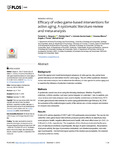Mostrar o rexistro simple do ítem
Efficacy of video game-based interventions for active aging. A systematic literature review and meta-analysis
| dc.contributor.author | Vázquez, Fernando L. | |
| dc.contributor.author | Otero, Patricia | |
| dc.contributor.author | García-Casal, J. Antonio | |
| dc.contributor.author | Blanco Seoane, Vanessa | |
| dc.contributor.author | Torres, Ángela J. | |
| dc.contributor.author | Arrojo, Manuel | |
| dc.date.accessioned | 2024-02-02T11:50:22Z | |
| dc.date.available | 2024-02-02T11:50:22Z | |
| dc.date.issued | 2018-12-11 | |
| dc.identifier.citation | Vázquez FL, Otero P, García-Casal JA, Blanco V, Torres ÁJ, Arrojo M (2018) Efficacy of video game-based interventions for active aging. A systematic literature review and meta-analysis. PLoS ONE 13(12): e0208192. https://doi.org/10.1371/journal.pone.0208192 | es_ES |
| dc.identifier.issn | 1932-6203 | |
| dc.identifier.uri | http://hdl.handle.net/2183/35355 | |
| dc.description.abstract | [Abstract] Background. Due to the appeal and recent technological advances of video games, the games have gained interest as an intervention tool for active aging. The aim of this systematic literature review and meta-analysis was to determine the efficacy of video games for active aging and to examine the influence of potential moderator variables. Methods. A systematic search was done using the following databases: Medline, PsycINFO, EMBASE, CINAHL and the Cochrane Central Register of Controlled Trials. In addition, previous reviews and meta-analyses were used to identify randomized controlled trials (RCT) of video game-based interventions for active aging published through February 28, 2018. An evaluation of the methodological quality of the articles and a meta-analysis and moderator analysis was conducted. Results. A total of 22 articles depicting 21 RCT with 1125 participants were included. The results indicated that video game-based interventions produced positive effects on objectively measured physical health, negative affect and social health, with small effect sizes (d = 0.41, d =0.26 and d = 0.40, respectively). The magnitude of this effect was moderated by the presence of subclinical conditions of participants, the type of game (exergames), the presence of physical activity, the type of prevention (indicated), non-blinded assignation, and older age of participants. The methodological quality of the studies was acceptable, the weakest area being external validity. Conclusion. These finding indicate that video game-based interventions may assist adults in leading active aging processes and preventing secondary aging. Although more research is needed, video game-based interventions are a promising and accessible tool for active aging promotion. | es_ES |
| dc.description.sponsorship | This study was funded by Center for Industrial Technological Development and the European Regional Development Fund (Grant: EXP- 00091195 / ITC-20161137 to FLV) | es_ES |
| dc.description.sponsorship | Industrial Technological Development and the European Regional Development Fund; EXP- 00091195 / ITC-20161137 | es_ES |
| dc.language.iso | eng | es_ES |
| dc.publisher | Public Library of Science | es_ES |
| dc.relation.uri | https://doi.org/10.1371/journal.pone.0208192 | es_ES |
| dc.rights | Atribución 3.0 España | es_ES |
| dc.rights.uri | http://creativecommons.org/licenses/by/3.0/es/ | * |
| dc.subject | Video games | es_ES |
| dc.subject | Active aging | es_ES |
| dc.title | Efficacy of video game-based interventions for active aging. A systematic literature review and meta-analysis | es_ES |
| dc.type | info:eu-repo/semantics/article | es_ES |
| dc.rights.access | info:eu-repo/semantics/openAccess | es_ES |
| UDC.journalTitle | PLos ONE | es_ES |
| UDC.volume | 13 | es_ES |
| UDC.issue | 12 | es_ES |
| UDC.startPage | e0208192 | es_ES |
Ficheiros no ítem
Este ítem aparece na(s) seguinte(s) colección(s)
-
UI- UIPSAL - Artigos [24]






